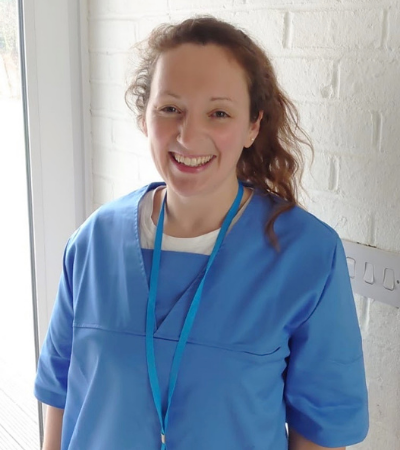
“As I spend my days giving the Covid-19 vaccine to people here at Queen Mary’s Hospital, Roehampton, I would definitely hope that people who live in other parts of the world won’t face a long wait before they too have this life-saving opportunity. It is vital that they are not forgotten or left behind,” says Maggie McColl, who has donned her scrubs and returned to nursing after several years away from her vocation.
“More needs to be done to support recovery from the pandemic beyond our own borders. The only way out of this is to recover together – no country is safe until all countries are safe.”
The effects of the pandemic
For the past five years, Maggie has worked for international development charity Tearfund, where she has witnessed first-hand life in some of the poorest communities in Rwanda, Malawi, Ethiopia, Cambodia, India and Nicaragua. The challenges many people around the world face as a result of extreme poverty, without basic healthcare or access to clean water, are compounded by Covid-19.
For example, before the pandemic hit, 22-year-old Solange from rural southern Rwanda had a flourishing tailoring business, but the lockdown, restrictions on movement and people’s reduced purchasing power caused her business to collapse. In communities struggling to put food on the table, buying new clothes was no longer a priority.

“I was so broke, there was a time when I couldn’t even get RWF100 (0.072 pence). I felt so depressed; I couldn’t contribute to the family needs as I used to do” explained Solange.
When her self-help group received funds from Tearfund, Solange was able to begin again: “I was able to get a new loan, and I bought sewing needles, materials and the other items I needed to restart my business. I am so thankful.”
Moved by what she saw, Maggie feels strongly about Tearfund’s calls for equal access to treatment and vaccines for people living in countries who can’t afford them.
Vaccines for all
Maggie explains that: “Millions of people in the UK have now received at least one dose of a Covid-19 vaccine, and this is great, but it is estimated that most lower-income countries will only be able to vaccinate one in ten people in 2021, and that millions of people will have to wait until at least 2022 for a vaccination.
“We can all relate to waiting for the vaccine to become available, but it’s hard to imagine that this glimmer of hope exists, in a country where you won’t have access to a vaccine for another year. It is desperately sad that there is such a huge divide between countries who can afford the vaccine to protect their population, and those who are being left behind.”
She says: “I am proud to be playing my part in the NHS, but I can’t just pretend there isn’t this great injustice between the people I am vaccinating here in the UK, and those around the world who also need to be protected and kept safe from this deadly virus.
“People in Rwanda and India are every bit as concerned for their elderly relatives and those with underlying health conditions as we are, but the truth is they are much further from a resolution to all this, and they are living in conditions which pose considerable risk.”
Tearfund is part of The People’s Vaccine Alliance, a growing movement of health and humanitarian organisations, world leaders, health experts, faith leaders and economists urging that everyone in every country should have fair and free access to a tested Covid-19 vaccine, free of charge.
The campaign highlights that some countries have enough doses to vaccinate everyone nearly three times, while others don’t have enough to even reach health workers and people at risk. Unless something changes dramatically, billions of people around the world will not receive a safe and effective vaccine for years.
Organisations backing this movement are calling on governments to ensure that pharmaceutical and research institutions working on a vaccine share science, technological know-how, and intellectual property so enough safe and effective vaccines can be produced.
So far, all of Moderna’s doses and 96 per cent of Pfizer/BioNTech’s have been acquired by rich countries.
In welcome contrast, Oxford/AstraZeneca has pledged to provide 64 per cent of their doses to people in developing nations. Yet despite their actions to scale up supply, they can still only reach 18 per cent of the world’s population next year at most.
Maggie is “really glad to be back in the NHS, making a tangible difference in the midst of this pandemic. This vaccine will allay fears and save lives.” But, she says, “I firmly believe that neither poverty nor country of residence should be a barrier to getting this.”
If you're grateful to have received a vaccine, you may like to express that by donating to Tearfund’s Recover Together appeal to support communities who still have a long and difficult wait for theirs. Please visit tearfund.org/campaigns/recover-together
communities who still have a long and difficult wait for theirs. Please visit tearfund.org/campaigns/recover-together






























